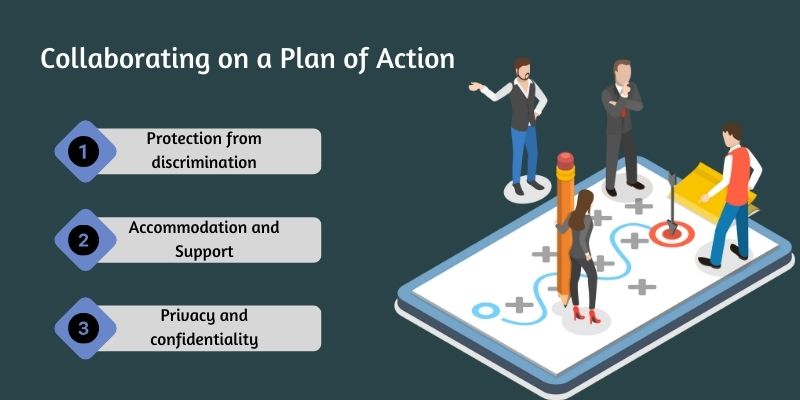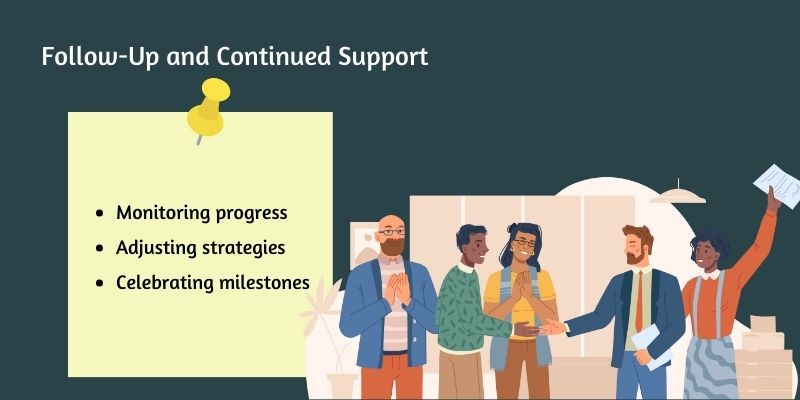Starting a conversation about addiction with your employer can be difficult, but it's a crucial step toward seeking help and support.
Addressing addiction in the workplace is essential for both the employee's well-being and the productivity and safety of the work environment.
Many individuals hesitate to talk to their employers about addiction due to the challenges and stigmas associated with discussing such personal issues in a professional setting. There's often a fear of judgment, discrimination, or the risk of losing their job.
However, ignoring the problem only allows it to worsen, potentially leading to negative consequences for both the individual and the organization.
As addiction can affect an employee's performance, behavior, and overall health, understanding how to talk to the employer about addiction becomes crucial.
By addressing addiction early on and seeking support from the employer, individuals can access the resources and assistance they need to overcome their addiction and regain control of their lives.
However, discussing addiction with an employer can be challenging due to the stigma and misconceptions surrounding the topic.
Employers have a legal and moral obligation to provide support and accommodations for employees facing addiction, and many organizations have policies and programs in place to assist individuals in need.
By initiating a conversation with your employer about addiction, you can take the first step towards getting the help and support you need to overcome your struggles and thrive in the workplace.
Preparing for the Conversation

Preparing for a conversation with your employer about addiction is essential to ensure it is productive and supportive. Here's how to get ready:
Self-reflection: Assessing one's readiness to discuss addiction with the employer
Before initiating the conversation:
-
Take some time for self-reflection.
-
Consider your readiness to discuss your addiction openly and honestly with your employer.
-
Reflect on your reasons for wanting this conversation and your goals for seeking support.
Being honest about your readiness and willingness to address the issue is essential.
Gathering information: Understanding company policies and available resources
Next, gather information about your company's policies and available resources related to addiction and mental health support.
Review your employee handbook, company policies, and any relevant HR materials to understand how addiction is addressed in the workplace.
Identify any support programs or resources available to employees, such as employee assistance programs (EAPs) or counseling services.
Identifying appropriate timing and setting for the conversation
Choose an appropriate time and setting for the conversation with your employer. Consider scheduling a private meeting to have a confidential discussion without interruptions.
Avoid times when your employer may be busy or stressed, such as during a busy workday or before an important meeting.
Choose a time when you and your employer can focus on the conversation and give it the attention it deserves.
By taking these preparatory steps, you can approach the conversation about addiction with your employer thoughtfully and constructively.
Being prepared will help you feel more confident and empowered to discuss your addiction openly and seek the support you need to address it effectively.
Initiating the Conversation

Initiating a conversation with your employer about addiction requires careful consideration of how to approach the topic sensitively and effectively. Here are vital steps to take when initiating the conversation:
Framing the discussion: Choosing the correct language and approach
When framing the discussion, choosing respectful, professional, and non-confrontational language and an approach is essential.
Avoid using accusatory language or placing blame. Instead, focus on expressing your concerns and seeking support. Be clear and concise in your communication, and remain open to feedback and discussion.
Expressing concerns: Communicating the impact of addiction on job performance.
Express your concerns to your employer about how addiction may be affecting your job performance.
Be honest about any challenges or difficulties you may be experiencing as a result of your addiction, such as decreased productivity, missed deadlines, or changes in behavior.
Help your employer understand the impact of addiction on your work and why addressing it is essential for you and the organization.
Presenting solutions: Suggesting possible accommodations or support options
Present possible solutions or accommodations that could help you manage your addiction while maintaining your job responsibilities. This may include requesting flexible work hours, access to counseling or treatment programs, or adjustments to job duties or responsibilities.
Be prepared to discuss potential solutions with your employer and collaborate on finding the best way forward.
By framing the discussion appropriately, expressing your concerns honestly, and presenting potential solutions, you can initiate a constructive conversation with your employer about addiction.
Approaching the conversation with professionalism, openness, and a willingness to work together can help foster understanding and support from your employer as you seek to address your addiction and improve your well-being in the workplace.
Handling Potential Reactions

When discussing addiction with your employer, it's essential to be prepared for various reactions. Here's how to navigate potential responses effectively:
Addressing employer concerns: Responding to questions about liability and productivity
Your employer may express concerns about liability issues or decreased productivity related to your addiction. Address these concerns directly by providing reassurance and information.
Explain any steps you are taking to address your addiction, such as seeking treatment or support, and emphasize your commitment to fulfilling your job responsibilities to the best of your ability.
Offer to collaborate with your employer to find solutions that mitigate any potential risks or concerns.
Managing stigmatization: Providing education and challenging misconceptions
Stigmatization of addiction may lead to negative attitudes or misconceptions from your employer.
Take the opportunity to educate your employer about addiction, its causes, and its impact on individuals. Share accurate information and personal experiences to challenge any misconceptions or stereotypes your employer may hold.
Encourage open-mindedness and empathy, and emphasize the importance of support and understanding in addressing addiction effectively.
Offering reassurance: Emphasizing commitment to recovery and professional growth
Reassure your employer of your commitment to recovery and professional growth. Express gratitude for their support and understanding, and emphasize your dedication to addressing your addiction and improving your well-being.
Highlight any steps you have taken to seek treatment, support, or counseling, and discuss your recovery and personal development goals.
By demonstrating your commitment to recovery and your willingness to work collaboratively with your employer, you can help alleviate concerns and build trust in your ability to overcome addiction.
Handling potential reactions from your employer requires patience, empathy, and effective communication.
By addressing concerns, challenging stigmatization, and offering reassurance, you can navigate the conversation with professionalism and confidence, fostering understanding and support from your employer as you seek to address your addiction and move forward in your professional journey.
Collaborating on a Plan of Action

Collaborating with your employer on a plan of action is crucial for addressing addiction effectively in the workplace. Here's how to work together to create a supportive and proactive approach:
Establishing goals: Setting realistic expectations and objectives
Start by establishing clear and realistic goals for addressing your addiction in the workplace. Work with your employer to identify specific objectives that align with your treatment plan and job responsibilities.
These goals may include attending counseling sessions, adherence to treatment protocols, or improving job performance. Setting clear expectations upfront allows you to track progress and measure success as you work towards recovery.
Exploring support options: Discussing employee assistance programs (EAPs) and external resources
Explore the support options available through your employer, such as employee assistance programs (EAPs), counseling services, or rehabilitation programs.
Discuss these resources with your employer and determine which options may be most beneficial for your situation.
Additionally, consider external resources such as support groups, community organizations, or treatment facilities that can provide additional support and assistance as you address your addiction.
Creating a supportive environment: Implementing accommodations and monitoring progress.
Create a supportive environment in the workplace by implementing accommodations or adjustments that can help you manage your addiction while fulfilling your job responsibilities.
This may include flexible work hours, modified duties, or access to confidential counseling services. Work with your employer to establish a plan for monitoring progress and evaluating the effectiveness of accommodations over time.
Regular check-ins and open communication ensure you have the support you need to succeed.
Training options: Providing addiction awareness and sensitivity training for employees and managers
Consider providing substance abuse awareness training for employees and managers to promote understanding and support in the workplace.
This training can help raise awareness about addiction, discuss the signs of substance abuse, reduce stigma, elaborate on the impact of substance abuse, and provide employees and managers with the tools and resources they need to support colleagues who may be struggling with addiction.
By fostering a culture of empathy, support, and acceptance, you can create a workplace environment where individuals feel valued, respected, and supported as they address addiction challenges.
Collaborating with your employer on a plan of action can help ensure you have the support and resources to address addiction effectively in the workplace.
By setting clear goals, exploring support options, creating a supportive environment, and providing training opportunities, you can work together to create a workplace culture that values health, well-being, and mutual support.
Follow-up and Continued Support

After establishing a plan of action to address addiction in the workplace, it's crucial to provide ongoing support and follow-up to ensure the effectiveness of the strategies implemented.
Here's how to continue supporting employees in their journey towards recovery:
Monitoring progress: Regular check-ins and evaluations
Schedule regular check-ins with the employee to assess their progress towards recovery and evaluate the effectiveness of the support strategies implemented.
During these meetings, discuss any challenges or successes the employee has experienced and provide encouragement and guidance as needed.
Use these check-ins to reaffirm your commitment to supporting the employee and address any concerns or issues that may arise.
Adjusting strategies: Making necessary modifications to the plan of action
Be flexible and open to adjusting the support strategies based on the employee's progress and evolving needs.
If specific accommodations or interventions are ineffective, work with the employee to identify alternative approaches to better meet their needs.
Continuously evaluate the action plan and make modifications as necessary to ensure it remains aligned with the employee's recovery goals and objectives.
Celebrating milestones: Recognizing achievements and promoting a culture of support.
Celebrate milestones and achievements reached by the employee in their journey towards recovery.
Whether reaching a certain period of sobriety, completing a treatment program, or achieving a specific work-related goal, acknowledge and celebrate these accomplishments to reinforce positive behavior and promote a culture of support and encouragement in the workplace.
Recognizing milestones boosts morale and reinforces employees' sense of accomplishment and motivation to continue working towards their recovery goals.
By providing ongoing follow-up and support, monitoring progress, adjusting strategies as needed, and celebrating milestones, employers can create a supportive environment that facilitates the employee's recovery journey and promotes their overall well-being and success in the workplace.
Final Words
Addressing addiction in the workplace is a complex and sensitive issue that requires collaboration, understanding, and support from both employers and employees.
Throughout this blog, we've explored various strategies to help you understand how to talk to your employer about addiction, initiate constructive conversations, handle potential reactions, and collaborate on a plan of action to support recovery.
Initiating a conversation about addiction with your employer can be daunting, but it's a crucial step toward seeking help and support.
Individuals can approach the topic with confidence and professionalism by preparing for the conversation, framing it appropriately, and presenting possible solutions.
It's essential to address any concerns or stigmas surrounding addiction openly and honestly, providing education and challenging misconceptions to foster understanding and empathy.
By working together, employers and employees can develop strategies that meet the individual's needs while promoting a safe and supportive work environment for everyone.
By providing ongoing support, recognition, and encouragement, employers can demonstrate their commitment to supporting employees in their recovery journey and promoting their overall well-being and success in the workplace.
Ultimately, addressing addiction in the workplace requires a collaborative and compassionate approach that can help in preventing the use of drugs at the workplace.